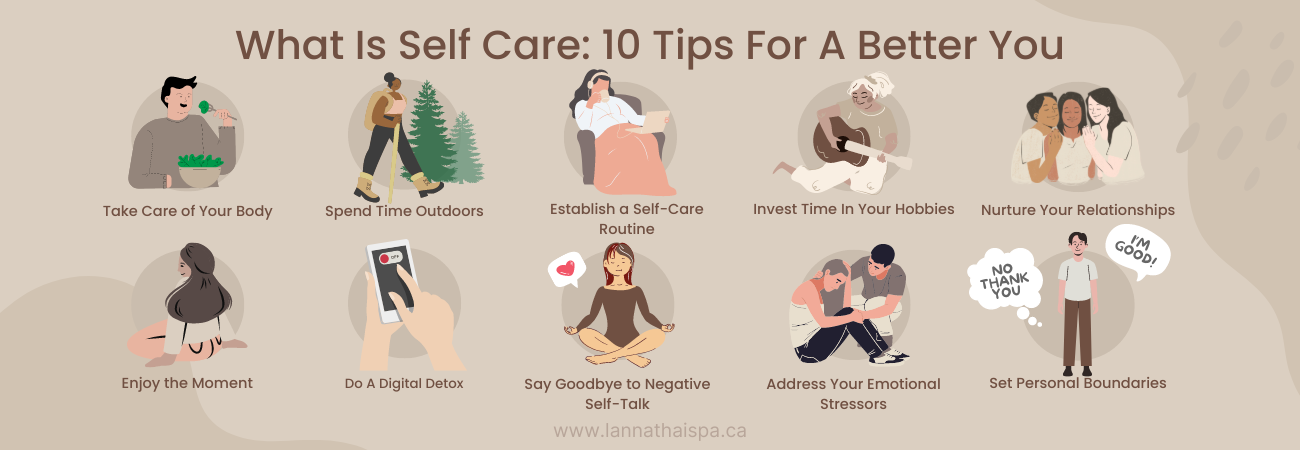Photo Credits to www.centerstone.org
Practicing self-care can significantly contribute to your mental health and overall well-being. Without it, you will be less resilient against life’s challenges, and you may experience increased stress, burnout, and a decline in both emotional and physical health.
Contrary to popular belief, self-care isn’t limited to expensive vacations or a visit to a luxurious spa. It can be as simple as getting some sun, trying out a new hobby, or simply enjoying the moment. By prioritizing self-care, you nurture your emotional health, enhance your physical health, and foster a balanced, fulfilling lifestyle.
What Is Self-Care?
Put simply, self-care is the practice of taking deliberate actions to maintain and improve your mental and physical health. It involves engaging in simple activities that reduce stress and promote your well-being.
Author of The Self-Care Prescription and licensed clinical psychologist Robyn Gobin says “My definition of self-care means knowing what is needed to ensure your health and happiness in life. It’s pouring into yourself and taking care of yourself.”
Many people ask, why is self-care important? Taking care of yourself is crucial because it gives you the mental, physical, and emotional energy to go through life, connect with others, and accomplish your goals. Think of yourself as a car – it will break down if it doesn’t get proper care and regular maintenance.
10 Self-Care Tips To Improve Your Overall Well-Being
It’s never too late to start taking care of yourself. Follow these effective self-care tips below and you’ll see the difference in no time!

1 – Take Care of Your Body
A healthy body equals a healthy mind, and vice versa. Optimum health starts with taking care of your body. If you feel good about your physical state, you will be in a good place mentally. Aim for 8 hours of good quality sleep, engage in regular physical exercise, and eat balanced, nutrient-rich meals daily.
I know it’s easier said than done, but we all have to start somewhere. Simple lifestyle changes such as no gadgets before bed, starting a quick daily walking routine, and reducing your fast food intake can go a long way.
2- Spend Time Outdoors
Spending time outdoors provides significant benefits to your mental health. You don’t have to go on a weekend camping trip or a hike up a mountain to get these benefits. In fact, spending some time out in your backyard, going for a walk in the park, or visiting your local garden can make a difference to improving your well-being. Anything is better than spending your day cooped up indoors without getting some sun or some fresh air.
Start spending more time outdoors or out in nature – it can help clear your mind and make you feel grounded.
3 – Establish a Self-Care Routine
Creating your own self-care routine makes it easier to integrate healthy habits into your daily life. Follow a routine that includes activities you enjoy and help you relax like taking a soothing bath every night, enjoying a weekly movie night, or starting a skincare routine.
4 – Invest Time In Your Hobbies
If you work full time, starting a new hobby might be the last thing on your mind. However, those who think that they don’t have time for leisure are the ones who actually need it. When you have a million things to do, it’s easy to put off activities that you love doing.
Prioritize self-care by setting aside time to rediscover your passions or to start a new hobby. You can finally take that art class, learn to cook that new dish, start your own garden, and so on. Investing time in your hobbies will leave you feeling refreshed.
5 – Nurture Your Relationships
No man is an island and we are sociable beings in nature. Having meaningful connections with those we care about is one of the strongest forms of self-care there is. Spending quality time with loved ones, engaging in deep conversations, and building a strong support system will all contribute to your overall well-being.
6 – Enjoy the Moment
Admit it or not, but we spend a lot of time regretting our mistakes of the past or worrying about the future. The truth is that we can’t change the past and the future is not guaranteed, so the best thing to do is to just focus our energy on the present moment.
Be mindful and just enjoy the present moment as it happens – you will learn to appreciate the little things more and find the positive in every situation, leading to a better mood.
7 – Do A Digital Detox
We can’t deny being glued to our phones for most of the day, whether it’s for work, for school, for communicating, or for entertainment. A medical study shows that an excessive amount of screen time can lead to anxiety and depression.
In social media alone, we can’t help but compare our life to others, leading to feelings of inadequacy and loneliness. Taking a break from screens can do so much for your mental health, so try to set aside a certain amount of time each day to disconnect from the digital world and connect with the real one.
8 – Say Goodbye to Negative Self-Talk
We don’t realize it, but we are often hard on ourselves. We let our negative thoughts take over before we do anything, which undermines our self-esteem and takes a hit on our confidence. If you catch yourself saying things like “I’m not good enough” or “I can’t do this”, replace those thoughts with positive ones. Over time, you’ll learn to be kinder to yourself and believe in your capabilities again.
9 – Address Your Emotional Stressors
When you’re feeling anxious, stressed, or overwhelmed, get on the bottom of it right away – don’t repress it, sleep on it, or wait for it to resolve on its own. The more you pretend that it’s not happening, the further you will be from peace of mind.
If a fight with someone is stressing you out, have a talk with that person and try to resolve your issues. The problem may not be resolved right away, but you’ll feel better and lighter.
10 – Set Personal Boundaries
Last but not the least, it’s important to learn to set healthy boundaries for yourself. Don’t allow peer pressure to get to you and say “no” when you need to so that you can protect your time, energy, emotional well-being, and most importantly, your self-respect.
Conclusion
Prioritizing self-care is a must. A few simple lifestyle changes like engaging in activities that make you smile and uplift your mood can go a long way in improving your mental and physical health, as well as your overall well-being.


Really great information can be found on web site.Leadership